- Home
- Anne Rivers Siddons
Colony Page 4
Colony Read online
Page 4
Everyone noticed and responded to him that evening. I saw it happen. I saw my Brundage grandparents and aunts and uncles and cousins in their accustomed places before one of the four great Adam mantels, where Brundages had stood to receive their friends since, I suppose, there had been any Brundages in Charleston, stop their flocking chatter and turn and look at him, and at me, and then at Kemble and our father, and I saw them nod and smile. And beckon us into their ranks. As we walked across the vast, shining floor to them, eyes burning like bees on my bare shoulders and neck, my father said in his soft, vague voice, “You know, Eulalie once told me I looked like an organ grinder’s monkey in tails,” and instead of a rush of rancor, or the accustomed sting of mortified tears, the new healing laughter came bubbling once more into my throat.
“She isn’t going to say it tonight,” I said. “And if she does, just tell her she looks like South America. Right down to the tatty little train on that dress. Aunt Eulalie could do with a little boning.”
“Did I tell you how pretty you look tonight?” my father said. “I probably didn’t. I think it often, but I never seem to get around to saying it. Your mother would be proud of you, little Maude. I am too.”
“And I am of you,” I said, finding the never-said words surprisingly easy on this magical night. “I’ve had a wonderful growing-up.”
He looked at me and smiled, just before we reached our group.
“And now you’re there, aren’t you? I just never noticed.”
“Neither did I,” I said.
After that, I could never remember the particulars of that ball. I tried often; I would lie in the dark of many predawns, in cold New Hampshire nights or firelit Maine ones, trying to tell the details to myself like the beads of a rosary. But I never could. For me, once the music started and the dance cards were filled and the first waltz swelled, that night was a runaway carousel of flowers, candles, music, laughter, champagne, flowing motion and billowing skirts and fast-coming breath. My dance card filled quickly, with the names of boys I had known all my life but somehow never seen before; I smiled and laughed and chattered and flirted as if I had done it all my life, but through each dance that I did not have with Peter my eyes kept seeking him, and whenever they found him, whirling some newly blossomed nursery school or Ashley Hall compatriot over the mirror floor, his eyes met mine and he smiled. He danced five dances with me—unheard of in that day and place—and his was the name scrawled on the sixteenth line. We did not, that night, do the new, fast, jittering dances that were coming into vogue; the Saint Cecilia has never really yielded itself up to modernity. We swayed and dipped together to the ballads of that year, though: “My Wonderful One,” “April Showers,” “Whispering,” “Three O’Clock in the Morning,” “A Kiss in the Dark.” And after the supper march and the never-varying feast of oysters and duck and turkey and wild rice and dessert and more champagne, we danced the last dance together, the sixteenth, to the traditional strains of “Auf Wiedersehen.”
As we danced, he sang the words softly in my ear, and I realized somewhere in mid-dance that he was singing in German. Somehow it seemed to me the most romantic thing I had ever heard in my life: faultless, a perfect thing, a grace note to joy.
“I didn’t know you spoke German,” I said. It was a stupid thing to say; how would I have known?
“I don’t,” Peter said. “I’m a complete fool at languages. Kemble told me about this dance and ‘Auf Wiedersehen,’ and I went to the library and memorized the German words. God help me if you know German; you don’t, do you?”
“No,” I said, beginning to cry. “I don’t.”
I fell in love with Peter at that precise instant. I don’t suppose many other women know the exact moment that the rest of their lives began.
Many years later, sitting out the terrible, howling hours while a hurricane lashed Retreat, I asked Peter why he had gone to the trouble to learn the German words of a song to sing to a girl he had never met.
“There was every chance that you’d think I was a total dud,” I said. “Or that I would you. It was an awful lot of effort for a blind date.”
I remember that the firelight picked out his forehead and cheekbones and teeth but did not reach his eyes. We had been in darkness for hours.
“Kemble had a picture of you at school,” he said. “In a canoe by yourself on a black creek, with moss hanging all around you. I think you must have been twelve or thirteen. You had a great big armful of waterlilies and you were wet from head to foot and you were laughing. I always thought, long, long before I met you, that if I could catch you it would be like catching a mermaid. I thought a mermaid was worth a little German.”
“And was she?” I said, my heart pounding with more than fear of the storm. There were many dangers abroad that night.
“Then and always,” Peter said. “Then and always.”
Very late that night, into the morning really, after we were home again and I lay in my bed thrumming like a stretched wire with fatigue and elation and triumph and a rising tide of something I could not name, I remembered that I had not put the lilacs back in water. Suddenly it seemed the most important thing in the world.
I got out of bed and put on my robe and tiptoed barefoot down the wide old stairs. Outside the window on the landing I could see that the huge white moon was flooding the woods and creek with cold silver radiance. But the house was dark and still. My father slept in his and my mother’s big bedroom at the back of the house, and Peter and Kemble were in the twin beds in Kemble’s old room, across from it. Both rooms were closed and silent.
I padded across the cold pine floorboards into the kitchen and put the lilacs, drooping sweetly now, into a bucket of water, and stopped to bury my face in them. I felt the foolish tears start again. I cried now with incompletion and an entirely new misery; after we got home Peter had said only, “Thanks for letting me take you to your dance, Maude. I had a wonderful time,” and had gone up the stairs with Kemble, laughing at some foolishness of his. The door had shut behind them, and presently the laughter had stopped. They were to go back to Princeton on the noon train the next day.
I mopped my face and drew a sniffling breath and went out onto the veranda. Peter sat in his satin-striped pants and white shirt, tieless and open-collared, rocking in one of the old wicker rocking chairs and smoking. I knew then that somehow I had known he would be there.
“What took you so long?” he said.
We danced on the banks of Wappoo Creek that night, Peter and I, danced in bare feet in the cold wet undergrowth while the moon poured its wild old silver down on us and the water ran black and ancient and the moss shone. We danced as Peter sang, softly, in his Boston baritone, “It’s three o’clock in the morning, we’ve danced the whole night through….”
When he stopped singing and we stopped dancing he kissed me.
“Tell me what you love most, Maudie,” he said, holding me loosely against him. His chin rested on the top of my head. I could feel the warmth of his body through his shirtfront. I could almost taste the salt of his skin through the fabric.
“Dancing in the dark with damn Yankees,” I tried to say lightly. My voice was an amphibian croak.
“No, really. What do you love best about your life? About living here, about Charleston?”
I thought. I thought of the slow yellow autumns in the swamp and the high honey sun of spring and the eternal silence of the marshes, and the shivering light on them, and the whisper of the spartina and sweet grass in the wind and the little liquid splashes of who-knew-what secret creatures entering that strange old place of blood-warm half earth, half water. I thought of the song of all the birds that I knew, and the soft singsong of the coffee-skinned women who sold their coiled sweet-grass baskets in the market and on Meeting Street. I thought of the glittering sun on the morning harbor and the spicy, somehow oriental smells from the dark old shops, and the rioting flowers everywhere, heavy and tropical and exotic. I thought of the clop of horses’ feet on cob
blestones and the soft, sulking, wallowing surf of Sullivan’s Island in August, and the countless small vistas of grace and charm wherever the eye fell: a garden door, a peeling old wall, an entire symmetrical world caught in a windowpane. Charleston simply could not manage to offend the eye. I thought of the candy colors of the old houses in the sunset, and the dark secret churchyards with their tumbled stones, and the pure sweet bells of Saint Michael’s in the Sunday morning stillness. I thought of my tottering piles of books in the study at Belleau and the nights before the fire when my father told me of stars and butterflies and voyages and the silver music of mathematics. I thought of hot, milky sweet coffee in the mornings, and the old kitchen around me, and Aurelia’s gold smile and quick hands and eyes rich with love for me.
Oh, Charleston, I thought. Oh, my Charleston.
“I love it all,” I said against Peter’s shirt, knowing only then that it was true. “There isn’t a single atom of it that I don’t love.”
“Could you leave it?”
“Yes,” I said.
Chapter
Two
A summer colony is a tyranny of old women. At least that was and still is true of Retreat, and from what I have heard from acquaintances who summer at other family enclaves up and down the East Coast, it is largely true everywhere. Why this is, I have never fully fathomed; many of the men who came to Retreat and those other Maine oases of the day were great powers in the life and economy of their cities and, in some cases, the nation. Many were the heads of businesses and industries whose names shone on other shores than that rocky one; others were greatly distinguished in their professions or simply the heirs to large personal fortunes. I never met a “summer” man in Retreat or anywhere else in Maine who did not have extraordinary resources of some sort at his disposal, or the eventual prospect of them. And yet it was a world ruled totally and with little nod to democracy by the old women of the tribe.
None of those women would have admitted such a thing if their orderly lives had depended upon it.
“Why, I do everything for my Peter and yours,” Mother Hannah said to me indignantly once, when I intimated that perhaps she and her friends were the kingdom and the power and the glory of Retreat. “From the minute I get up in the morning to the minute I lay my head on my pillow at night, my every thought and move is for the comfort and well-being of my husband and son. And every wife and mother up here feels the same way and acts it, and so should you, Maude. Our men work themselves to the bone for us all year. Their recreative weeks are a sacred thing.”
And on the surface it was true. The men who summered in Retreat lived days and nights of what seemed to me perfect carefree symmetry. You would see them on terraces and verandas in the cold blue early mornings, wrapped in woolen robes or heavy sweaters, drinking their coffee and looking out over the still, pink-flushed harbor. A bit later you would meet them on the silent paths through the birch groves or on the dirt road into the village, walking sticks to hand, striding through their morning constitutionals. By nine o’clock, in those long summer days, they would be on the little clay tennis court in correct white-clad quartets or sliding their big slender sloops and ketches and yawls out of the yacht club harbor or heading for the rough little golf course up at the Cove Club in the modest old cars they kept for the country.
The very young would be led about like downy ducklings by bored and restless village girls or nannies, down to the shore, to paddle in the flat calm off the pebble beach, or to the yacht club, where Amos Carter waited to begin the first wobbling lessons in the fleet of stubby little Brutal Beasts. The very old might pass mornings on terraces wrapped in steamer rugs, nodding or reading or visiting back and forth. But in all the years I came to Retreat, I saw few of them lift a hand to the running of that carefully rustic world. For that, there was the taciturn army of the natives—who made the bulk of their year’s living serving the leisure of the summer people—and there were the young women.
And behind them all, like a corps of dark-clad gimlet-eyed generals, were the old women.
To me, in those first days, “old” was anyone the age of Peter’s parents and beyond. But there were many younger women, platoons of them. Young wives and mothers like myself and yet so obviously and regrettably unlike me, an occasional unmarried young belle, many girl children, and a few aging daughters destined for spinsterhoods of starch and seemliness. All those women served. They served their own young husbands and families as the old women had taught them and continued to instruct them; they served the colony in its communal cultural and social endeavors; they served the little village and the surrounding townships, donating talent and money and long hours to benefit the hospital, the library, the free clinic, the Women’s Self-Help League, the bake sales and the jumble sales and the flower markets. They poured out tea and coffee and made finger sandwiches and cookies and cleaned and redecorated the yacht club and saw that the children’s playground was kept mowed and trimmed and comfortable for the nannies, and they hosted countless little luncheons and small cocktail parties and bridge evenings and desserts for their mother-in-laws’ friends, and they marketed and drove to the egg and the vegetable ladies’ houses every morning, and to the laundress’s cottage, and to the fishmonger’s truck down at the harbor, and to the nursery over in Lincolnville, to keep borders and window boxes on the old gray-and brown-shingled cottages bright and summery.
They cheered on their husbands and their brown sons in tennis matches and regattas in the mornings, and visited around at other cottages in the afternoons with covered plates of fresh rolls and cookies and pots of tuberous begonias from the old gardens, and put toddlers down for naps and often oldsters too, and they bathed in the old claw-footed tubs in the cooling afternoons and dressed in their carefully simple cotton frocks and put pale cashmere sweaters around their shoulders and sprayed on little jets of 4711, and went down to stand behind the chairs of the old women, and fetch drinks and hors d’oeuvres and fans and canes and shawls for them, and to laugh at their deaf-loud sallies and oft-repeated anecdotes, and to help heave them from their chairs and give them their pale arms in to dinner. There were not many suntanned young women in Retreat. They were sunless and tired. Most of their eyes closed instantly in exhaustion when at last they got into their beds in small hot upstairs bedrooms, beside husbands who had long been stunned into sleep by fresh air and salt wind and alcohol. The young women of the summer colonies of the Northeast were the worker drones. Cannon fodder, Amy Potter, who was one, once called them.
But…and it was an all-important but…they were in training to be the old queens, and they knew it. One day they would sit on the porches and be driven about the countryside by their own daughters-in-law and have license to drink one drink too many at cocktail parties or say any outrageous and hurtful thing that came into their minds, and bully the servants and the wives of their sons and their grandchildren unmercifully, if they wished, and to break themselves any of the thousands of small, immutable iron rules that they laid down for the comportment of colony conduct, even while they enforced them for others. They could, as their elders did now, look back on their own days of servitude and obedience and extract the last full measure of flesh and spirit from their handmaidens. It was a self-perpetuating cycle, and in it lay and still lies power, absolute and fearsome. The men thought themselves outside it, and so laughed at it, but they lived every moment of their summers in Retreat by the sufferance of that power, and most never even realized it. It was the young women who knew the faces of their jailers and who had, or thought they had, no recourse but to smile into them even as their shackles were tightened.
The old women of Retreat…for my first few summers there, I came close to hating them. Now I am one, and here is Darcy, my dearly loved Darcy, fetching my tea and extending to me her brown arm to hold…brown, for Darcy, like me, never managed to be a success in her role as tender and cup-bearer here. But still, here we are. Nothing really changes in Retreat. It is why, I think, that in the long run
I came to love it so. It was stranger to me when I first came here than the back of the moon, but, like my own small old world so far to the south, my Charleston, it was eternal.
Hard, though…oh, in the beginning, it was hard. Even before I saw it for the first time, I was afraid of Retreat. I had only to think of a summer there in the big old brown-shingled house with Peter’s father and his omniscient, omnipresent mother, and my heart froze in my breast. I, who before our marriage had confidently expected to love Peter’s summer haven and be loved there, who had rapturously and loudly planned each slow, serene, sun-and ocean-washed day, knew before I passed through the old lilacs at the door that I was about as welcome as cholera. When we drove into Retreat from New Hampshire on that June day in 1923, in the smart little open Buick roadster Peter’s mother had given him for graduation, I was staggering under a load of baggage I knew I would never put down.
When he left Charleston for Princeton after the Saint Cecilia, it was understood that we would marry. Or at least I understood it, and I thought Peter did too, though we had no formal agreement. But I knew; how could I not, after that night on Wappoo Creek? At the train, with Kemble pulling at his sleeve and the great wheels beginning to turn, Peter said only that he would write. And he kissed the top of my head and was gone. And I went home to Belleau, to weep with longing for him and to wait.

 Colony
Colony Nora, Nora
Nora, Nora House Next Door
House Next Door Homeplace
Homeplace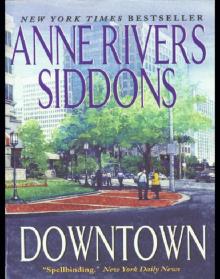 Downtown
Downtown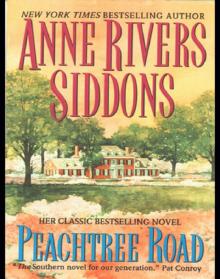 Peachtree Road
Peachtree Road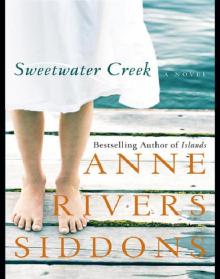 Sweetwater Creek
Sweetwater Creek Fault Lines
Fault Lines Low Country
Low Country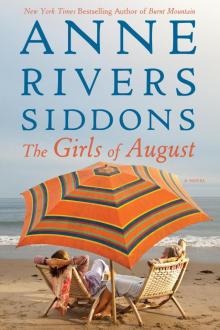 The Girls of August
The Girls of August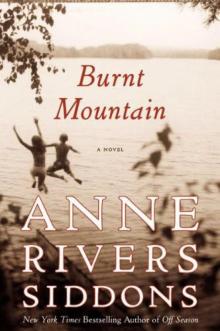 Burnt Mountain
Burnt Mountain Islands
Islands